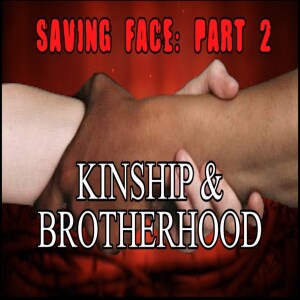

Saving Face - Part 2 - Brotherhood & Kinship
In this Bible teaching by Matthew Vander Els from Founded in Truth Fellowship, the focus is on understanding the concept of brotherhood and kinship within the context of honor and shame, particularly as it relates to the culture of the first century and the teachings of Yeshua (Jesus). Vander Els emphasizes that grasping the cultural backdrop of the time is crucial for a deeper and more applicable understanding of Scripture. Without this context, biblical texts can seem like mere words, open to various interpretations. Studying the culture strengthens our faith in the words of Scripture by revealing their original meaning and significance.
One key point discussed is the definition of love in the Near East, which differed significantly from the modern, emotion-centric understanding. In the first century, love was essentially synonymous with covenantal loyalty. This understanding impacts how we interpret biblical passages about God's love, highlighting His unwavering loyalty to us.
The teaching revisits the concept of honor and shame, building upon a previous discussion. In first-century society, every action reflected on an individual's reputation, a concept similar to "face" in Eastern cultures. Maintaining "face" meant having an honorable reputation, while losing it resulted in shame. The honor and shame of an individual were also deeply intertwined with their family and kinship group. Families in the ancient world were collectivistic, meaning an individual's honor or shame reflected on their entire clan. Status was often ascribed by lineage rather than solely by personal merit. This is illustrated by the Roman practice of including clan names with personal names and the Israelite tradition of identifying individuals by their father's name and tribal affiliation. The "sons of Aaron" designation carried significant weight due to Aaron's honorable role as the first priest.
The concept of ascribed family honor, or inherited reputation, meant that individuals were often expected to uphold the honor of their reputable ancestors. This posed a challenge for Yeshua, whose humble family background, particularly his mother Mary's poverty, made him less credible in the eyes of some who knew his lineage. In Jewish culture, sons often used their father's name to claim their reputation, as seen in names like Barabbas (son of the father) and Bartimaeus (son of Timaeus).
Yeshua and John the Baptist used strong language, such as "offspring of vipers," to challenge the supposed honor of the Pharisees and Sadducees, highlighting that their lineage was stained by the actions of their ancestors. This was a significant insult in an honor-shame culture.
The teaching explains the concept of social duels, which were public conflicts where honor was at stake. Every public interaction in the first century carried the potential for one's honor to be challenged. This is contrasted with modern individualistic societies where social reputation is less fragile in everyday encounters. In the first century, individuals represented the honor of their entire kinship group. Challenges and responses in public could either strengthen or diminish one's honor. Yeshua frequently faced such challenges from the religious leaders.
Understanding honor and shame is crucial for appreciating the social environment of early Christianity, influencing aspects like kinship systems, public and private spaces, patronage, slavery, economic practices, purity rules, and meal practices. Honor status in the first century primarily came from group recognition, making it a public matter. Interactions, both positive (gift-giving, invitations) and negative (insults, debates), played into this "honor game." Yeshua's authority being questioned in Mark 11 is presented as a perfect example of this challenge-response dynamic.
To find more Bible Teachings, click the link.
Application for Everyday Life:- Prioritize Loyalty in Relationships: Cultivate covenantal loyalty in your relationships, reflecting the biblical understanding of love that goes beyond fleeting emotions.
- Recognize Shared Identity in Christ: Understand that as believers, your honor and shame are now tied to Christ, not primarily to your earthly reputation or family lineage in the same way as the first century.
- Be Mindful of Group Impact: Remember that your actions can impact the perception of the entire body of believers, reflecting the collectivistic nature of kinship in Scripture.
- Avoid the World's Honor-Shame Game: Refuse to be drawn into petty arguments or conflicts solely for the sake of defending your earthly honor. Instead, focus on the honor you have in Christ.
- Practice Secret Righteousness: Seek to do good deeds without seeking public praise, understanding that your true reward comes from God.
- Embrace Humility: Follow Yeshua's example by valuing humility and considering others as more important than yourself.
- Resolve Conflict with Wisdom: When disagreements arise within the community of faith, strive for dialogue, listen to others, and avoid being quick to quarrel.
- Extend Kinship to Fellow Believers: Recognize and treat all fellow believers as your brothers and sisters in Christ, part of your spiritual kin, regardless of background.
- Esteem Others in the Body of Christ: Value and honor the unique roles and contributions of every member of the body of Christ, recognizing that we are all interconnected.
- Share Christ's Honor and Love: Make it a priority to share the good news of Jesus Christ with those who do not know Him, demonstrating His love and extending the invitation to His honor.
Bible Verses:
- Mark 6:3
- Matthew 3:7
- Matthew 12:34
- Matthew 23:29
- Luke 2:36
- Luke 1:5
- Acts 13:6
- Matthew 5:38
- Matthew 5:39
- Matthew 6:1
Books and Resources Mentioned:
- The Bible by Various Authors
- The Mishnah
- The Talmud
- Catholic Encyclopedia
Note: This article contains affiliate links.
More Episodes
All Episodes>>You may also like
Create Your Podcast In Minutes
- Full-featured podcast site
- Unlimited storage and bandwidth
- Comprehensive podcast stats
- Distribute to Apple Podcasts, Spotify, and more
- Make money with your podcast












